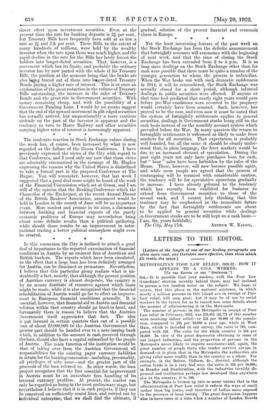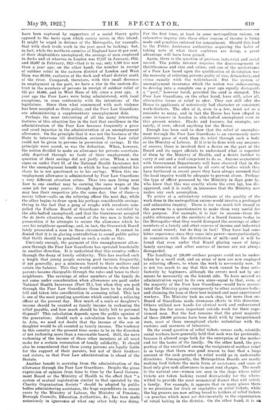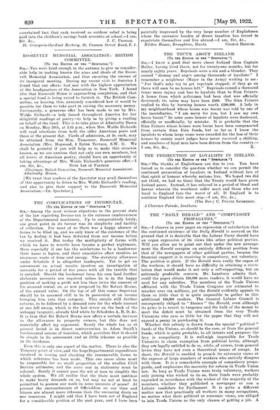LETTERS TO THE EDITOR.
[Letters of the length of one of our leading paragraphs are often more read, and therefore more effective, than those which Jill treble the space.] METROPOLITAN POOR LAW RELIEF, 1921-22: HOW IT APPEARS TO A C.O.S. WORKER.
[To THE EDITOR OF " SPECTATOR."] SIR,-It is possible that your readers, with the Poor Law Guardians' election recently behind them, may feel inclined to peruse a few random notes on the subject. We hope, of course, that this phase in the national existence, in which nearly a million persons in this island are in receipt of Poor Law relief, will soon pass; but it may be of use to social workers in the future for us to record now some details about the manner of administering it in the Metropolis.
The number of persons in the Metropolis in receipt of Poor Law relief in February, 1922, was 235,415 (52,771 of this number were receiving indoor relief)—or 525 per 10,000 of the popula- tion, compared to 255 per 10,000 a year ago, while in West Ham, which is included in our survey, the ratio is 789, com- pared with 424. The ratio for the whole country is 534 per 10,000. In view of the great depression obtaining in some of our largest industries, and the proportion of persons in the Metropolis never likely to require assistance—and, again, the great number of people there who render services always in demand—it iS plain that in the Metropolis the authorities are giving relief more readily than in the country as a whole. For example, in the Bolton, Oldham, &c., district, although the cotton trade is in a very bad way, the ratio is 128 per 10,000; in Dundee and Dunfermline, with the industries terribly de- pressed and civilization perhaps less developed- than anywhere else in the country, it is 180.
The Metropolis is broken up into so many unions that in the administration of Poor Law relief it reflects the ways of small rather than big towns, and therefore of bodies more exposed to the pressure of local feeling. The great depression happens also to have come at a time when a number of London Boards
have been captured by supporters of a social theory quite opposed to the basis upon which society exists in this island. It might be urged in defence of the Metropolis, for example, that with slack trade work in the port must be lacking; but, in fact, while the northern counties of England have 41 per cent. of their shipbuilders unemployed, the average of men employed in docks and at wharves in London was 17,237 in January, 1922, and 18,697 in February, 1921—that is to say, only 1,300 less now than .a year ago; on the other hand, the number in receipt of outdoor relief in the eastern district of London and West Ham was 99,910, exclusive of the dock and wharf district south of the river. Compared, therefore, with this small decrease in employment in the port, we have a rise in the eastern dis- trict in the numbers of persons in receipt of outdoor relief of 423 per 10,000, and in West Ham of 424, since a year ago. A year ago the Poor Laws were being administered, with local exceptions, in some conformity with the intentions of the legislature. Since then what commenced with mob violence has been accepted as State policy, and the Poor Law Guardians are administering a supplementary unemployment dole.
Perhaps the most interesting of all the many interesting features of this situation lies in the fact that excellence in the administration of the Poor Law becomes frequently a gross and cruel injustice in the administration of an unemployment allowance. On the principle that it was not the business of the State to intervene till destitution arrived, Poor Law relief could not be given to persons in possession of savings. If the principle were sound, so was the deduction. When, however, the nation decided to make an allowance for persons ascertain- ably deprived through no fault of their employment, the question of their savings did not justly arise. When a man signs on under Part II. of the National Health Insurance Act for the unemployment benefit to which he has contributed his share he is not questioned as to his savings. When this un- employment allowance is administered by Poor Law Guardians a very different situation arises. Thus two men living next door to one another may be earning the same wages at the same job for many years; through depression of trade they may lose their respective jobs the same day. One of them—a merry fellow—calls on the relieving officer the next day, while the other begins to draw upon his perhaps considerable savings. Owing to the fact that a gang of roughs with revolvers com- pelled the Fulham Board of Guardians to vote out-relief to the able-bodied unemployed, and that the Government accepted the de facto situation, the second of the two men is liable to prosecution if he attempts to secure the allowance which he eees his neighbour spending; and, in fact, the Greenwich Board lately prosecuted a man in these circumstances. It cannot be denied that it is in glaring contradiction to sound public policy that thrift should be penalized on such a scale as this.
Curiously enough, the payment of this unemployment allow- ance through the Poor Law Guardians has operated beneficially in another direction. It is undoubted that this country suffers through the decay of family solidarity. This has reached such a length that young people earning good incomes frequently, if not generally, pay a minimum board to their mothers and retain the balance. This they would continue to do when their parents became chargeable through the rates and taxes to their neighbours. The earnings of other members of the family do not come under consideration when allowances are paid under National Health Insurance (Part II.), but when they are paid through the Poor Law Guardians these have to be stated in full and taken into consideration in assessing relief. This last is one of the most puzzling questions which confront a relieving officer at the present day. How much of a son's or daughter's income should be counted as family income in reckoning the relief payable, and how much should be fairly left to personal disposal? This calculation depends upon the public opinion of the generation; should such a calculation have to be made in Asia, we need not doubt that the income of the son or daughter would be all counted as family income. The tendency in this country at the present time seems to be in the direction of not reckoning more than a reasonable board. Still, the mere reckoning of the income of these other members at all must make for a certain restoration of family solidarity. It should also be remembered that these young persons are legally liable for the support of their parents, but not of their brothers and sisters, so that Poor Law administration is ahead of the Statute.
Another benefit is accruing from the administration of the allowance through the Poor Law Guardians. Despite the pious expression of opinion from time to time by the Local Govern- ment Board or the Ministry of Health to the effect that " a system of mutual registration similar to that operated by the Charity Organization Society " should be adopted by public bodies administering assistance, the huge expenditure in recent years by the Ministry of Labour, the Ministry of Pensions, Borough Councils, Education Authorities, &c., has been made notoriously in ignorance of what any other body was doing. For the first time, at least in some metropolitan unions, an exhaustive inquiry into these other sources of income is being made and penalties enforced for concealment. Should this lead to the Public Assistance authorities acquiring the habit of taking note of what their confreres are doing, a great advantage will have been gained.
Again, there is the question of previous industrial and social record. The public interest requires the discouragement of thriftlessness and vice and crime, and one of the misfortunes of a Poor Law based upon the qualification of destitution was the necessity of relieving persons guilty of vice, debauchery, and crime equally with the well-behaved. But the system of unemployment insurance which the nation was endeavouring to develop into a complete one a year ago equally disregards a " past," however lurid, provided the card is stamped. The Poor Law Guardians, on the other hand, have still, after all, alternative forms of relief to offer. They can still offer the House to applicants of notoriously bad character or consistent
work-shirkers. The offer of it, even to a few, must act as a reminder to many, and in fact the House has been offered in some instances in London to able-bodied unemployed even in this present winter. Blacks and Lascars, for example, are rarely, if ever, offered anything but the House.
Enough has been said to show that the relief of unemploy- ment through the Poor Law Guardians is an enormously more elaborate piece of work than its relief through such a body as the Ministry of Labour. If it is to be done with any measure of success, there is involved first a desire on the part of the Board and its upper officials to understand what is expected of them by the Ministry of Health, and a. desire further to carry it out and a staff competent to do so. Anyone acquainted with Government Departments will have observed that in the great extension of assistance by all sorts of bodies which they have furthered in recent years they have always assumed that the local inquiry would be adequate to prevent abuse. Perhaps the type of officer possessed by the Ministry in days gone by, who knew that this was exactly where the crux lay, has dis- appeared, and it is really in innocence that the Ministry now makes any such assumption.
To arrive at a satisfactory estimate of the quality of the work done in the metropolitan unions would involve a prolonged and exhaustive inquiry. There is far too much left unsaid in the answeus to a questionnaire to make them very useful for this purpose. For example, it is fair to assume—from the public utterances of the members of a Board famous to-day in the Metropolis—that they would disregard the earnings of other members of a family and other sources of income and industrial and social record; but do they in fact? They have had some bitter experience since they came into power—more particularly in connexion with the distribution of milk—and it will he found that even under that Board glaring cases of largo family earnings and other sources of income are not always disregarded.
The handling of 230,000 outdoor paupers could not be under- taken by a small staff, and an army of men are now employed as relieving officers, to whom the work is necessarily new. It
is not too much to say that this work cannot be done satis- factorily by beginners, although the errors need not by any
means be necessarily on the lenient side. To have secured an administration equal to its own aims—equal to that, even, of the majority of the Poor Law Guardians—would have necessi- tated the Ministry going courageously to other assistance bodies and claiming the loan of their best trained and most experienced workers. The Ministry took no such step, but more than one Board of Guardians made strenuous efforts in this direction.
Others utilized new hands for clerical work and endeavoured to keep the far more important outside work for their expe- rienced men. But the fact remains that the great majority of these 230,000 persons have been dealt with by inexperienced men, most of them unemployed clerks unfamiliar with the customs and manners of labourers.
On the vexed question of relief tickets versus cash, soientific social workers have generally held that cash was far preferable, because it allowed scope both for the enterprise of the mother and for the tastes of the family. On the other hand, the pro- portion of the uncivilized among the recipients of outdoor relief is so large that there was good reason to fear that a largo amount of the cash granted in relief would go in undesirable directions. Consequently, the Metropolitan Boards are mostly making food tickets the main form of assistance, and some at least only give cash allowances to meet rent charges. The result is the natural one—women are seen in the shops where relief tickets are taken looking round distractedly for the where- withal to provide the most economical dinner that will satisfy a family. For example, it appears that in many places there
is no provision for fruit or vegetables on relief tickets, while the big grocers are now selling bread to holders of relief tickets —a practice which must act detrimentally to the organization of retail baking in the district. On the other hand, it is as
ascertained fact that cash received as outdoor relief is being paid into the children's savings bank accounts at school.—I am,




































 Previous page
Previous page